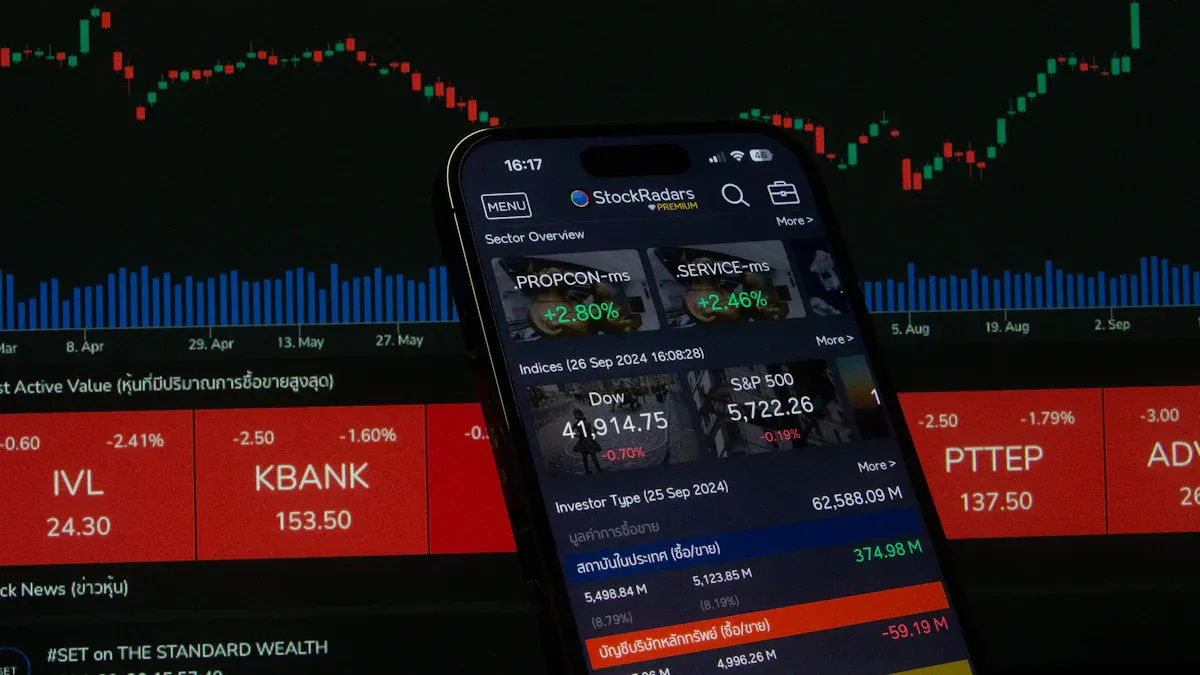- EasyCard
- Trade
- Help
- Announcement
- Academy
- SWIFT Code
- Iban Number
- Referral
- Customer Service
- Blog
- Creator
HSBC Stock Account Fees, Monthly Charges, and Trading Costs Comparison Guide

Image Source: pexels
Do you want to open an HSBC stock account? You can refer to the following key fee details for 2025:
| Item | Fee (in USD, 1 USD ≈ 7.8 HKD) |
|---|---|
| HK Stock Minimum Commission | USD 8 per trade |
| US Stock Minimum Commission | USD 18 per trade |
| Monthly Fee | Some accounts have no monthly fee (e.g., Trade25) |
| Minimum Deposit Requirement | None |
Note: You should pay attention to potential fees such as IPO subscription fees and margin interest. Some accounts offer commission-free promotions, so make sure to review the relevant terms.
Key Points
- HSBC stock accounts have no minimum deposit requirement, with a low entry barrier, suitable for beginners and small-scale investors.
- Trading commissions for HK stocks, US stocks, and A-shares are approximately 0.25%, with minimum fees of USD 13 for HK stocks and USD 18 for US stocks and A-shares per trade.
- HSBC offers various account types, such as Trade25 and One accounts, some of which provide no monthly fees and commission-free promotions, catering to different investor needs.
- HSBC stock accounts are suitable for long-term or large-scale investors who value fund safety and brand confidence, while short-term or small-scale traders may consider brokers with lower commissions.
- Investors should be aware of IPO subscription fees, margin interest, and other miscellaneous fees, and regularly check official fee schedules to avoid extra costs.
Main Fees

Image Source: pexels
HK Stocks, US Stocks, and A-Share Commissions
When choosing an HSBC stock account, you are most concerned about trading commissions in different markets. Below are the latest fees for 2025:
| Market | Minimum Commission (per trade) | Notes |
|---|---|---|
| HK Stocks | USD 13 (approx. HK$100) | Per trade basis |
| US Stocks | USD 18 | Per trade basis |
| A-Shares | USD 18 | Per trade basis, refer to the official website for details |
- You can find this data on MoneySmart’s HSBC stock account comparison page.
- HSBC stock accounts have no minimum funding requirement, making the entry barrier low.
- A-share fees and commission-free conditions are not fully disclosed; you are advised to check HSBC’s official website for the latest information.
Tip: Commission structures vary across markets and can impact your trading costs. You should choose an account based on your target investment market.
Monthly Fees and Commission-Free Conditions
HSBC stock accounts offer flexible monthly fee arrangements. You can choose different account types to enjoy various monthly fee benefits:
- Standard Account: Generally no monthly fees.
- Trade25 Account: If you are aged 18 to 25, you can enjoy no monthly fees and some commission-free promotions.
- HSBC One Account: Some account packages offer monthly fee reductions or waivers.
You don’t need to worry about minimum deposit requirements, as HSBC stock accounts have no minimum funding restrictions when opening an account. This is very beginner-friendly for new or small-scale investors.
Note: Commission-free promotions usually come with conditions, such as age, trading frequency, or account type. You should carefully review the official terms to avoid unexpected fees.
Other Fees
In addition to basic commissions and monthly fees, you need to be aware of the following potential fees:
- IPO Subscription Fees: The bank charges a handling fee for each IPO application.
- Margin Interest: If you use margin (financing) for stock trading, you need to pay interest, with rates varying based on market conditions.
- Other Miscellaneous Fees: These include stock transfer fees, physical stock withdrawal fees, etc., which vary depending on the operation.
You should regularly check HSBC’s official website, as all fees are subject to the latest official announcements. This helps avoid unnecessary costs due to outdated information.
HSBC Stock Fee Comparison

Image Source: pexels
HK Stock Fee Comparison
When choosing a platform for HK stock trading, you are most concerned about per-trade commissions and minimum fees. According to HKCoding’s latest data, here is a comparison of HK stock fees for major banks and brokers in 2025:
| Platform | Trading Commission (per trade) | Minimum Fee (per trade) | Dividend Collection Fee | Custody Fee | Other Features |
|---|---|---|---|---|---|
| HSBC Stock | 0.25% | USD 13 | USD 2 | None | No minimum deposit requirement |
| Bank of China Hong Kong | 0.25% | USD 13 | USD 2 | None | |
| Hang Seng Bank | 0.25% | USD 13 | USD 2 | None | |
| Standard Chartered Bank | 0.25% | USD 13 | USD 2 | None | |
| BOCOM Securities | 0.0678% | USD 2.6 | USD 1 | None | Low commissions |
| Futu Securities | 0.03% | USD 0 | USD 0 | None | Frequent commission-free promotions |
| SoFi Hong Kong | 0.05% | USD 0 | USD 0 | None | Beginner-friendly promotions |
You can see that traditional Hong Kong banks like HSBC Stock, Hang Seng Bank, and Bank of China Hong Kong have similar commission rates, with minimum fees around USD 13. Brokers like Futu and SoFi offer lower commissions, even commission-free promotions. If you trade small amounts or frequently, brokers are more cost-effective. If you value fund safety and brand confidence, bank platforms are more suitable for you.
US Stock and A-Share Fee Comparison
When investing in US stocks or A-shares, commissions and minimum fees are equally important. Below is a comparison of US stock and A-share fees for major platforms:
| Platform | US Stock Commission (per trade) | US Stock Minimum Fee | A-Share Commission (per trade) | A-Share Minimum Fee | Other Features |
|---|---|---|---|---|---|
| HSBC Stock | 0.25% | USD 18 | 0.25% | USD 18 | No minimum deposit requirement |
| Bank of China Hong Kong | 0.25% | USD 18 | 0.25% | USD 18 | |
| Hang Seng Bank | 0.25% | USD 18 | 0.25% | USD 18 | |
| Standard Chartered Bank | 0.25% | USD 18 | 0.25% | USD 18 | |
| BOCOM Securities | 0.08% | USD 2.6 | 0.08% | USD 2.6 | Low commissions |
| Futu Securities | 0.0049/share | USD 0 | 0.03% | USD 0 | Frequent commission-free promotions |
| SoFi Hong Kong | USD 0 | USD 0 | Not supported | Not supported | Commission-free US stocks |
You will notice that Hong Kong banks like HSBC Stock have higher minimum fees for US stocks and A-shares, suitable for investors with larger trade amounts. Brokers like Futu and BOCOM offer lower commissions, ideal for small or high-frequency trades. SoFi Hong Kong focuses on commission-free US stocks but does not support A-shares.
Platform Monthly Fee Comparison
When choosing a stock account, you also need to consider whether the platform charges monthly fees. Below is a comparison of monthly fees for major platforms:
| Platform | Monthly Fee | Conditions for Fee Waiver |
|---|---|---|
| HSBC Stock | None (standard account) | Trade25 and One accounts may be exempt from monthly fees |
| Bank of China Hong Kong | None | |
| Hang Seng Bank | None | |
| Standard Chartered Bank | None | |
| BOCOM Securities | None | |
| Futu Securities | None | |
| SoFi Hong Kong | None |
You can rest assured that most banks and brokers currently do not charge monthly fees. HSBC Stock’s Trade25 and One accounts offer additional monthly fee waivers for young investors or specific account packages. If you are a beginner or small-scale investor, these no-monthly-fee policies can save you significant fixed costs.
Fee Structure Summary and Suitable Investors
- If you value brand, fund safety, and comprehensive financial services, Hong Kong bank platforms like HSBC Stock are more suitable for you. These platforms have higher commissions but offer comprehensive services, ideal for long-term or large-scale investors.
- If you seek low costs, frequent trading, or small-scale investments, brokers like Futu Securities, BOCOM Securities, and SoFi Hong Kong are more attractive. These platforms have low commissions and even commission-free promotions, suitable for short-term or beginner investors.
- You should choose the most suitable platform based on your investment habits and capital size.
Potential Fees
IPO Subscription
If you want to apply for IPOs using an HSBC stock account, the bank will charge an IPO subscription fee. Generally, for each IPO application, HSBC charges approximately USD 5 to USD 10 (approx. HK$39 to HK$78), with the exact amount varying based on the IPO type and application method. You also need to note that some IPOs may incur additional administrative fees or refund check fees. You should check HSBC’s official website for the latest fee details before applying.
Tip: IPO subscription fees are not reduced based on the application amount. If you frequently apply for IPOs, these fees can add up, so calculate the total cost carefully.
Margin Interest
If you want to use margin (financing) for stock trading, HSBC will charge margin interest. In 2025, HSBC’s margin annual interest rate is approximately 7% to 8%, with the actual rate varying based on market rates and your account type. For every USD 1,000 borrowed, you will pay approximately USD 70 to USD 80 in interest per year. You should regularly check HSBC’s latest announcements, as rates fluctuate with the market.
- Margin interest is calculated daily and charged monthly.
- If you use margin for a long period, interest expenses will increase significantly.
Note: Margin trading carries higher risks. You should assess your repayment ability and risk tolerance.
Other Miscellaneous Fees
When using an HSBC stock account, you may encounter other miscellaneous fees. Common miscellaneous fees include:
- Stock Transfer Fee: Approximately USD 2 to USD 5 per transfer.
- Physical Stock Withdrawal Fee: Approximately USD 20 per stock.
- Dividend Collection Service Fee: Approximately USD 2 per collection.
- Other Administrative Fees: Such as account statement mailing fees or special inquiry fees.
You should regularly check your bank statements to watch for unclear charges. If you have questions, contact HSBC immediately.
Tip: All miscellaneous fees are subject to HSBC’s latest announcements. You should understand the relevant fees before performing special operations to avoid unnecessary expenses.
Investor Tips
Long-Term Investment
If you plan to hold stocks long-term, an HSBC stock account is a solid choice. You can benefit from the brand confidence and fund safety of a Hong Kong bank. Long-term investors typically trade less frequently, so commission costs have less impact. You can use HSBC’s comprehensive financial services to manage assets conveniently. You should regularly check account fees to ensure no unexpected charges.
Tip: Long-term investors can choose accounts with no monthly fees to reduce fixed expenses.
Short-Term/Frequent Trading
If you trade stocks frequently, commissions and minimum fees will directly affect your returns. HSBC stock accounts have higher per-trade minimum commissions, suitable for users with larger trade amounts. If you trade small amounts each time, consider comparing brokers’ low-commission options. You should calculate your total monthly trading costs to choose the most suitable platform.
Note: Frequent trading generates more commission expenses, so pay attention to the relationship between trading frequency and costs.
Beginners/Small-Scale Investors
If you are new to investing or have limited funds, HSBC stock accounts have no minimum deposit requirement, making the entry barrier low. You can start with small amounts to experience the stock market. You should choose accounts with no monthly fees to minimize unnecessary expenses. You can also use HSBC’s financial tools to learn basic investment knowledge.
- Tip: Beginners should take advantage of the bank’s educational resources to understand stock market operations.
High-Net-Worth/High-Frequency Traders
If you have substantial capital or frequently conduct large trades, HSBC stock accounts’ safety and service quality are more suitable for you. You can enjoy dedicated relationship managers and diverse financial services. Large trades can spread out the per-trade minimum commission, reducing average costs. You should communicate with the bank to explore exclusive offers or tailored services.
Tip: High-net-worth investors can consider applying for premium accounts to access more exclusive financial support.
When choosing a stock account, you should first compare fees, monthly charges, and trading costs. HSBC stock accounts are suitable for those who value fund safety and brand confidence. Long-term or large-scale investors are better suited for bank platforms. Before opening an account, review the fee details and watch for potential charges. Choosing the most suitable platform based on your investment habits is key.
FAQ
Does an HSBC stock account have a minimum deposit requirement?
When you open an HSBC stock account, there is no minimum deposit requirement. You can start investing with any amount at any time.
How are commissions calculated for HSBC stock accounts?
For each HK stock, US stock, or A-share trade, the bank charges a 0.25% commission, with minimum fees of USD 13 (HK stocks) and USD 18 (US stocks and A-shares) per trade.
Does an HSBC stock account have monthly fees?
You don’t need to pay monthly fees for standard accounts. When using Trade25 or One accounts, you can also enjoy monthly fee waivers.
Which markets does an HSBC stock account support?
You can trade HK stocks, US stocks, and A-shares with an HSBC stock account. For other markets, check the official website.
What are the potential miscellaneous fees for an HSBC stock account?
You may encounter IPO subscription fees, margin interest, stock transfer fees, and dividend collection service fees. You should regularly check the official fee schedule.
HSBC’s stock account offers a reliable platform for HK and US stock trading, but high commissions and cross-border remittance costs may impact returns. BiyaPay provides an all-in-one financial solution to optimize global investments! Users can trade US and HK stocks in real-time without an overseas bank account, managing global markets with one account. Remittance fees are as low as 0.5%, covering 190+ countries with same-day fund transfers. The flexible savings product yields a 5.48% annualized return, with daily interest credited automatically.
It supports real-time conversion of 30+ fiat currencies and 200+ cryptocurrencies, secured by KYC verification. Register in minutes to manage funds effortlessly. Try BiyaPay now to start your global investment journey! Pair it with HSBC and join BiyaPay today at BiyaPay for efficient investing and steady returns!
*This article is provided for general information purposes and does not constitute legal, tax or other professional advice from BiyaPay or its subsidiaries and its affiliates, and it is not intended as a substitute for obtaining advice from a financial advisor or any other professional.
We make no representations, warranties or warranties, express or implied, as to the accuracy, completeness or timeliness of the contents of this publication.




Contact Us
Company and Team
BiyaPay Products
Customer Services
is a broker-dealer registered with the U.S. Securities and Exchange Commission (SEC) (No.: 802-127417), member of the Financial Industry Regulatory Authority (FINRA) (CRD: 325027), member of the Securities Investor Protection Corporation (SIPC), and regulated by FINRA and SEC.
registered with the US Financial Crimes Enforcement Network (FinCEN), as a Money Services Business (MSB), registration number: 31000218637349, and regulated by FinCEN.
registered as Financial Service Provider (FSP number: FSP1007221) in New Zealand, and is a member of the Financial Dispute Resolution Scheme, a New Zealand independent dispute resolution service provider.



















